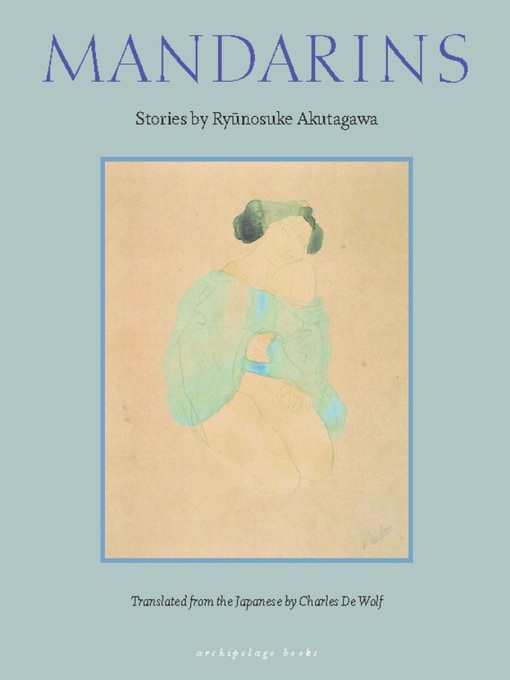"In [Akutagawa's] spare, textured prose . . . he brings us clear-eyed glimpses of human behavior."- The New York Times Book Review
In Mandarins, Akutagawa blends a sense of sad inevitability with subtle irony. Reflective and often humorous, these tales reveal an enormous amount about Japanese culture, but above all the inner struggles of the characters always strike the universal.
Ryunosuke Akutagawa was born in Tokyo in 1892. After a period of severe depression, Akutagawa committed suicide in 1927, at age thirty-five. Eight years after his death he was commemorated through the establishment of the Akutagawa Prize for literature, the most prestigious literary prize in Japan.
-
Creators
-
Publisher
-
Release date
May 1, 2007 -
Formats
-
Kindle Book
-
OverDrive Read
- ISBN: 9781935744122
-
EPUB ebook
- ISBN: 9781935744122
- File size: 1731 KB
-
-
Languages
- English
-
Reviews
-
Publisher's Weekly
September 3, 2007
There's a lot more to Akutagawa (1892-1927) than his short story "Rashomon," made famous by the Kirosawa film, and not among these 13 tales, delicately balanced worlds in miniature. Newly translated, they evoke the lost splendor and conflicts of Rashomon's Meiji Era. "The Garden" depicts a crumbling inn belonging to the once-great family Nakamura; presciently, the last surviving relative, Ren'ichi, has abandoned the land to attend art school in Tokyo. Titled after a line from Basho, "O'er a Withered Moor" re-creates, in an quiet Osaka residence, the mournful last moments of a great man's life, surrounded by his grieving, anxious disciples. The exquisite "Kesa and Morito" is made up of soliloquies by two lovers who contemplate murdering Kesa's husband in order to consummate their conflicted longing for each other. Modern tales include the vignette "Mandarins," the account of a ennui-laden train traveler who looks on in delighted astonishment as his young peasant co-passenger throws oranges to her brothers, waving as they pass. Akutagawa's stories are gorgeous and intimate. -
Library Journal
July 16, 2007
There's a lot more to Akutagawa (1892-1927) than his short story "Rashomon," made famous by the Kirosawa film, and not among these 13 tales, delicately balanced worlds in miniature. Newly translated, they evoke the lost splendor and conflicts of Rashomon's Meiji Era. "The Garden" depicts a crumbling inn belonging to the once-great family Nakamura; presciently, the last surviving relative, Ren'ichi, has abandoned the land to attend art school in Tokyo. Titled after a line from Basho, "O'er a Withered Moor" re-creates, in an quiet Osaka residence, the mournful last moments of a great man's life, surrounded by his grieving, anxious disciples. The exquisite "Kesa and Morito" is made up of soliloquies by two lovers who contemplate murdering Kesa's husband in order to consummate their conflicted longing for each other. Modern tales include the vignette "Mandarins," the account of a ennui-laden train traveler who looks on in delighted astonishment as his young peasant co-passenger throws oranges to her brothers, waving as they pass. Akutagawa's stories are gorgeous and intimate.Copyright 2007 Library Journal, LLC Used with permission.
-
Loading
Why is availability limited?
×Availability can change throughout the month based on the library's budget. You can still place a hold on the title, and your hold will be automatically filled as soon as the title is available again.
The Kindle Book format for this title is not supported on:
×Read-along ebook
×The OverDrive Read format of this ebook has professional narration that plays while you read in your browser. Learn more here.


